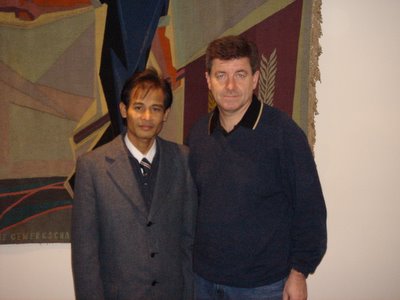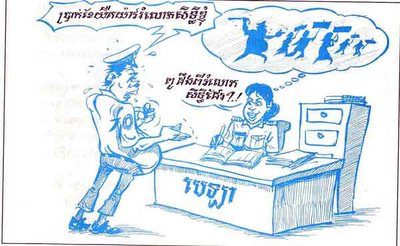Public Statement
AI Index: ASA 23/007/2005 (Public)
News Service No: 346
22 December 2005
Dedicated to publishing sensitive information about Cambodia


 Brussels 19 December 2005 (ICFTU OnLine): At a meeting with Chea Mony on 19 December in Brussels, President of the Cambodian trade union centre FTUWKC, ICFTU General Secretary Guy Ryder pledged to intensify pressure on the Cambodian government to drop charges against Mony and other Cambodian union leaders of defamation against the country's government and inciting others to commit a crime. Rong Chhun, President of the Cambodia Independent Teacher's Association, was arested and detained in October on similar charges, and arrest warrants have been issued against Man Nath, President of the Combodian Independent Civil Servants' Association and Ear Channa, Deputy General Secretary of the Student Movement for Democracy. Man Nath and Ear Channa are currently in Thailand facing extraditino to Cambodia. The charges were laid in response to a statement critical of the Cambodian government made by the four on the signing of a border agreement between Cambodia and Vietnam.
Brussels 19 December 2005 (ICFTU OnLine): At a meeting with Chea Mony on 19 December in Brussels, President of the Cambodian trade union centre FTUWKC, ICFTU General Secretary Guy Ryder pledged to intensify pressure on the Cambodian government to drop charges against Mony and other Cambodian union leaders of defamation against the country's government and inciting others to commit a crime. Rong Chhun, President of the Cambodia Independent Teacher's Association, was arested and detained in October on similar charges, and arrest warrants have been issued against Man Nath, President of the Combodian Independent Civil Servants' Association and Ear Channa, Deputy General Secretary of the Student Movement for Democracy. Man Nath and Ear Channa are currently in Thailand facing extraditino to Cambodia. The charges were laid in response to a statement critical of the Cambodian government made by the four on the signing of a border agreement between Cambodia and Vietnam. Cop: Late paycheck is a violation of my rights.
Cop: Late paycheck is a violation of my rights.
To read the full text of the law go to http://cambodiapolitics.org/laws/untaclaw_1992en.pdf
<Click on photos to view larger size>
Translated from Khmer by KI-Media
09 December 2005
Reported by Sok Serey, Radio Free Asia, Phnom Penh
Mam Sonando, the manager of the Beehive Radio Station [hosting RFA and VOA programs inside Cambodia] was summoned to the Phnom Penh municipal court by the prosecutor in regards to two additional charges leveled against him: one by the government representative, and one by the National Assembly representative, about spreading of disinformation. However, Mam Sonando denied all the new allegations.
Mam Sonando was questioned for almost three hours by the prosecution judge Thoang Oul.
Hong Kim Suon, Mam Sonando’s lawyer, told the news media outside the courtroom that the two new charges came from Kim San, the secretary of the National Assembly, and the other one from the government lawyer who accused Mam Sonando of spreading disinformation. He indicated that the new charges concern the penal code.
He also indicated that the Phnom Penh municipality court prosecutor had already charged his client based on these two new accusations, and today the judge had summoned his client for questioning.
Hong Kim Suon added also: “He (Mam Sonando) had denied all charges, and he said that he did not spread disinformation as he is accused. What he was doing, he did it according to the journalist ethic code.”
Dy Phanara, Mam Sonando’s wife, said that her husband did not do anything wrong as he was accused of. She declared that the accusations against her husband are not fair.
Mam Sonando was escorted by about 10 prison guards from the Prey Sar jail, they are armed with guns and batons, and they also physically restrained him from the courtroom and shoved him into the car while preventing him from talking to journalists present.
The authority also physically restrained and yanked shirt collars of journalists, and pushed them using brute force in order to prevent Mam Sonando from talking to them.
Mam Sonando shouted to the journalists: “They have the right to accuse me, I also have the right to provide clarifications back. I cannot accept these accusations at all.”
Mam Sonando, the manager of Beehive radio, was first accused by the government lawyers of defamation against Prime Minister Hun Sen. He was subsequently arrested and incarcerated in Prey Sar jail since October following the broadcast of an interview with Mr. Sean Pengse, the border expert who lived in France, in which the signing of the supplemental border treaty with Vietnam was discussed.
